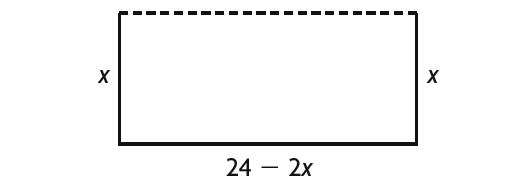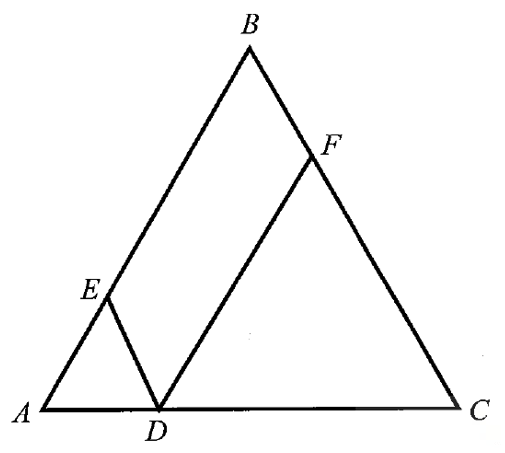DOMAIN AND RANGE OF A FUNCTION WORKSHEET
Questions 1-4 : Find the domain and range of the function.
1. f(x) = 5x + 9
2. g(x) = -3(x + 1)2 + 6
3. h(x) = √(2 - x)
4. p(x) = 1/(x - 2)
5. A gull landing on the guardrail causes a pebble to fall off the edge. The speed of the pebble as it falls to the ground is a function is v(d) = √(2gd) where d is the distance, in meters, the pebble has fallen, v(d) is the speed of the pebble, in meters per second (m/s) and g is the acceleration due to gravity—about 9.8 meters per second squared (m/s2). Determine the domain and range of v(d), the pebble’s speed.
6. Vitaly and Sherry have 24 m of fencing to enclose a rectangular garden at the back of their house.
a) Express the area of the garden as a function of its width.
b) Determine the domain and range of the area function.

Answers
1. Answer :
f(x) = 5x + 9
This is a linear function, so x and y can be any value.
Domain = {x ∊ R}
Range = {y ∊ R}
2. Answer :
g(x) = -3(x + 1)2 + 6
This is a quadratic equation in vertex form. The function has a maximum value at the vertex (-1, 6), x can be any value.
Domain = {x ∊ R}
Range = {y ∊ R | y ≤ 6}
3. Answer :
h(x) = √(2 - x)
We cannot take the square root of a negative number, so (2 - x) must be positive or zero.
2 - x ≥ 0
x ≤ 2
Domain = {x ∊ R | x ≤ 2}
√(2 - x) means the positive square root, so y is never negative.
Range = {y ∊ R | y ≥ 0}
4. Answer :
p(x) = 1/(x - 2)
The given function is a rational function.
To find the domain of a rational function, we have to find the value of x that makes the denominator zero.
In 1/(x - 2), if we substitute x = 2, the denominator becomes zero and it is undefined.
So, p(x) is defined for all real values of x except x = 2.
Domain of p(x) = R - {2}
To find range of the rational function above, find the inverse of p(x).
p(x) = 1/(x - 2)
y = 1/(x - 2)
Interchange the variables.
x = 1/(y - 2)
Solve for y in terms of x.
(y - 2)x = 1
y - 2 = 1/x
y = 1/x + 2
y = (1 + 2x)/x
y = (2x + 1)/x
p-1(x) = (2x + 1)/x
Find the domain of p-1(x).
In (2x + 1)/x ,if we substitute x = 0, the denominator becomes zero and it is undefined.
So, p-1(x) is defined for all real values of x except x = 0.
Domain of p-1(x) = R - {0}
Range of p(x) = Domain of p-1(x)
Range of p(x) = R - {0}
5. Answer :
When d = 0 the pebble begins to fall, and d = 346 when it lands.
So, the domain is 0 ≤ d ≤ 346.
The pebble starts with speed 0 m/s.
v(0) = v(d) = √(2 ⋅ 9.8 ⋅ 0) = 0
When the pebble lands, d = 346.
v(346) = √(2 ⋅ 9.8 ⋅ 346)
= √6781.6
≈ 82.4
The domain is
{d ∊ R | 0 ≤ d ≤ 346}
and the range is
{v(d) ∊ R | 0 ≤ v(d) ≤ 82.4}
6. Answer :
They need fencing on only three sides of the garden because the house forms the last side.

Let the width of the garden be x m.
Then the length is (24 - 2x).
Let A(x) be the area of the garden.
A(x) = x(24 - 2x)
= 24x - 2x2
= -2x2 + 24x
= -2(x2 - 12x)
= -2[x2 - 2(x)(6) + 62 - 62]
= -2[(x - 6)2 - 36]
A(x) = -2(x - 6)2 - 72
The smallest the width can approach is 0 m. The largest the width can approach is 12 m.
Domain = {x ∊ R | 0 < x < 12}
A(x) = -2(x - 6)2 - 72 is a quadratic equation in vertex form and it has a maximum value at the vertex (6, 72).
Range = {A(x) ∊ R | 0 < A(x) ≤ 72}
Kindly mail your feedback to v4formath@gmail.com
We always appreciate your feedback.
©All rights reserved. onlinemath4all.com
Recent Articles
-
Digital SAT Math Problems and Solutions (Part - 148)
Apr 22, 25 08:20 AM
Digital SAT Math Problems and Solutions (Part - 148) -
Eliminating the Parameter in Parametric Equations
Apr 21, 25 10:37 PM
Eliminating the Parameter in Parametric Equations -
Quadratic Equation Problems with Solutions (Part - 3)
Apr 21, 25 02:37 AM
Quadratic Equation Problems with Solutions (Part - 3)
